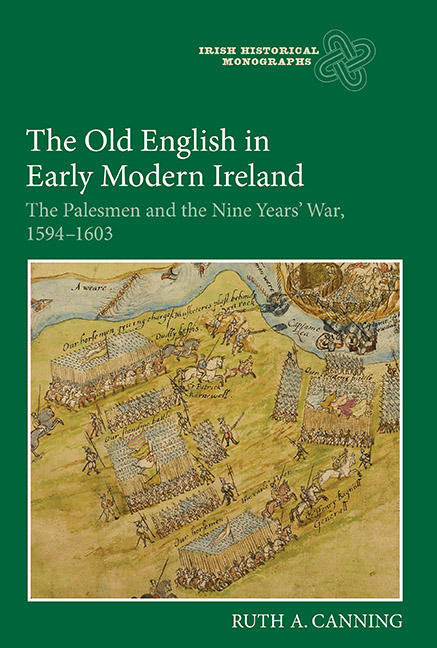Book contents
- Frontmatter
- Dedication
- Contents
- Acknowledgements
- Note on Conventions
- Abbreviations
- 1 Pale Politics: An Old English Community and the Outbreak of War
- 2 Instruments of Sedition: Priests and the Pale
- 3 Secret Traitors and Crown Colluders: The Palesmen's Response to Patriotic Pressures
- 4 ‘Patriot Games’: Old English Participation in the Crown's Military Enterprise
- 5 ‘Road to Perdition’: The Socio-Economic Impact of War on the Pale
- 6 Office and Influence: Defending a Tradition of Privilege
- Epilogue: An Inconclusive Aftermath
- Bibliography
- Index
- Irish Historical Monographs Previous Volumes
3 - Secret Traitors and Crown Colluders: The Palesmen's Response to Patriotic Pressures
Published online by Cambridge University Press: 07 September 2019
- Frontmatter
- Dedication
- Contents
- Acknowledgements
- Note on Conventions
- Abbreviations
- 1 Pale Politics: An Old English Community and the Outbreak of War
- 2 Instruments of Sedition: Priests and the Pale
- 3 Secret Traitors and Crown Colluders: The Palesmen's Response to Patriotic Pressures
- 4 ‘Patriot Games’: Old English Participation in the Crown's Military Enterprise
- 5 ‘Road to Perdition’: The Socio-Economic Impact of War on the Pale
- 6 Office and Influence: Defending a Tradition of Privilege
- Epilogue: An Inconclusive Aftermath
- Bibliography
- Index
- Irish Historical Monographs Previous Volumes
Summary
By the 1590s the majority of Old English Palesmen were conscious of an everwidening gulf between them and their English-born brethren, yet they were still a long way from conceding to any theory which suggested that they now had more in common with their Gaelic Irish compatriots. Ironically, this was one area in which the English crown and Hugh O'Neill could agree. For these two enemies, the Old English shared two crucial national characteristics with the Gaelic Irish: their faith and their fatherland. O'Neill seized on these two features as the foundations for a revitalised nationalist philosophy during the Nine Years’ War. He did so because he recognised that he would need the support of the Old English population if he was to ever achieve the overthrow of English authority in Ireland. Without even minimal assistance from the Pale and southern towns, the Confederates would lack the military and victual supply system necessary for waging a full-out war. More importantly, lacking the artillery necessary for taking fortified towns, O'Neill would need at least tacit support from within the Pale if he hoped to oust the English government from its Dublin stronghold. O'Neill therefore targeted the Palesmen with passionate words and fair promises. Meanwhile, crown officials, conscious of growing discontent with English policies and administrators, worried that the Palesmen might be convinced and so they gravely entertained accusations of treason against many leading Old English figures. Some, of course, did join the rebellion but, contrary to O'Neill's hopes and administrators’ fears, convincing the Old English to join him was not such an easy task.
Prior to the outbreak of hostilities, Hugh O'Neill had shown little interest in spiritual matters and it is probably fair to assume that his ambitions were far greater than a religious settlement for Ireland.3 On earlier visits to Dublin he had regularly accompanied lords deputy to Protestant services without expressing any struggle of conscience. The more likely impetus for O'Neill's rebellion lay in his political grievances and his personal aspirations. More than anything else, he wanted to attain unqualified authority over the north. Achieving this would require an all-Ireland agenda and he would need to provide legitimate and just reasons for intransigence.
- Type
- Chapter
- Information
- The Old English in Early Modern IrelandThe Palesmen and the Nine Years’ War, 1594–1603, pp. 50 - 83Publisher: Boydell & BrewerPrint publication year: 2019



